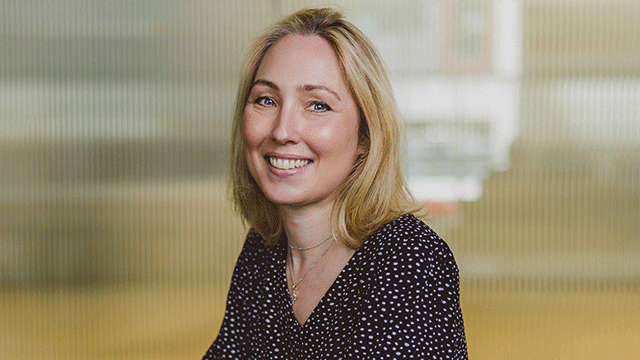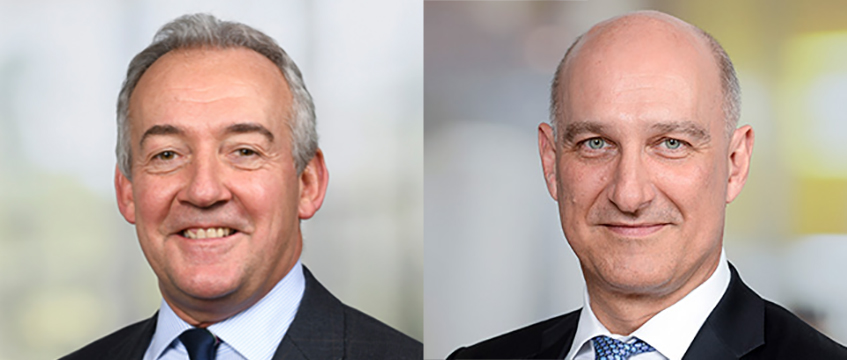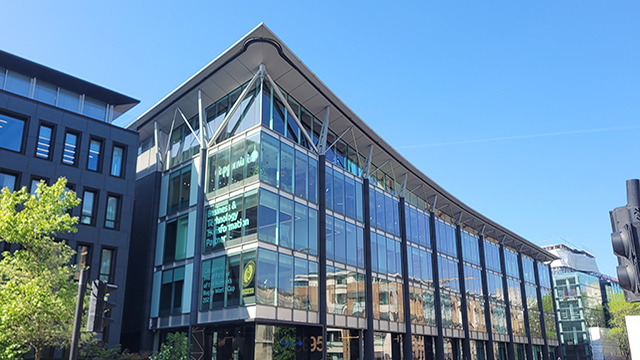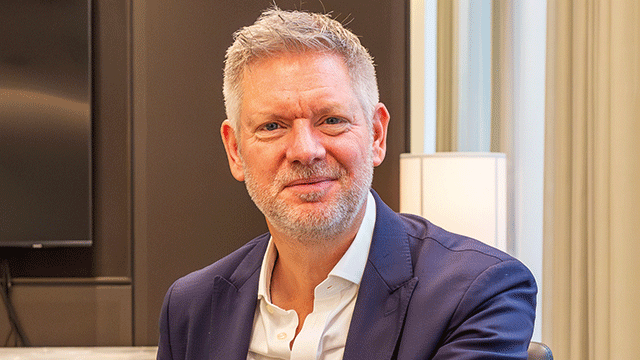Savills bosses talk Covid lessons, Russian risks and hiring plans
The Covid-19 pandemic may not truly be over, but a dwindling number of face masks spotted in public, increasingly busy commuter trains and the return of workers to the office – for some days at least – all suggest a corner has been turned. In the real estate world, so too do the recent numbers coming out of the big agencies. In many cases, business has not only bounced back from the lows of the pandemic but also surpassed previous records.
Savills is the latest to demonstrate that . Full-year revenue for 2021 came in at £2.15bn, up by almost a fifth on 2020 and ahead of 2019’s £1.91bn, the previous record. Pre-tax profit stood at £200m, more than double that of a year earlier and up by three-quarters from 2019’s £115.6m, again the high mark until now. Analysts at investment bank Numis have called the performance “exceptional”.
For chief executive Mark Ridley (pictured above, left), the results validate a string of decisions made within the group when the pandemic hit, and an approach he describes as “hold the nerve, hold the course”.
The Covid-19 pandemic may not truly be over, but a dwindling number of face masks spotted in public, increasingly busy commuter trains and the return of workers to the office – for some days at least – all suggest a corner has been turned. In the real estate world, so too do the recent numbers coming out of the big agencies. In many cases, business has not only bounced back from the lows of the pandemic but also surpassed previous records.
Savills is the latest to demonstrate that. Full-year revenue for 2021 came in at £2.15bn, up by almost a fifth on 2020 and ahead of 2019’s £1.91bn, the previous record. Pre-tax profit stood at £200m, more than double that of a year earlier and up by three-quarters from 2019’s £115.6m, again the high mark until now. Analysts at investment bank Numis have called the performance “exceptional”.
For chief executive Mark Ridley (pictured above, left), the results validate a string of decisions made within the group when the pandemic hit, and an approach he describes as “hold the nerve, hold the course”.
“One of the major strategic decisions we took early on was to maintain bench strength through what was going to be a difficult period, particularly in the transactional markets, which were obviously going to be impacted straight away,” Ridley says. “Not only did we hold our nerve and maintain that bench strength, we actually increased it in some areas. That allowed us, as a springboard, to come back as markets recovered. We can ricochet into greater opportunities and greater market share.”
The company pinned the 2021 performance on recovery across the residential and commercial transactional markets, where divisional revenue grew by 31% and 35% respectively, as well as stronger showings in investment management, property management and consultancy.
Of course, the company faces fresh threats as the industry tries to work out what Russia’s invasion of Ukraine and growing global political tensions could mean for markets. Savills has already suspended its dealings with a Russian affiliate, as have several other agencies. Ridley is wary of making assumptions as the situation evolves but says history holds lessons.
“There will be a polarisation, particularly from investors, towards the more secure global markets,” he says. “Property, in its nature, has been quite a safe-haven asset. So prime in prime markets will do quite well through this period. London, major European capitals, the major Asia-Pac cities, I think they will do pretty well. Those economies are going to be robust.”
Macroeconomic concerns
For chief financial officer Simon Shaw (pictured above, right), there are also macroeconomic concerns to keep track of. “The big question is how much of a long-term inflationary and interest rate effect this has on the globe and impacts on GDP,” he says. “But the clear impact today is the obvious one, which is that investors are sitting on their hands somewhat as they see how it plays out, which is only natural.
“The real estate market tends to take stock in situations of big exogenous shocks and then continue on thereafter. And there is an argument that there might be greater allocation to the secure income of real estate in due course if the world is more worried about prospective returns from corporate equity [and other assets].”
The agency is focused on channels for growth, and Ridley expects acquisitions and new hires to add to Savills’ strengths. He highlights project management as a priority, alongside the consultancy side of the business. And the property management arm is set for further growth.
“We’re bloody good at it, and we think it’s a terrific area of service for clients,” Ridley says. “The clients that get these services realise that property management is no longer about just collecting a rent cheque. You’ve got to look after your occupiers. Good property management services are showing greater value to the client base.”
Those relationships grew even tighter during the events of the past two years, Ridley adds. “Our clients needed more servicing than ever, because it was their hour of need just as much as it was for us,” he says. With a new hour of need seemingly emerging, those lessons could be called on soon.
To send feedback, e-mail tim.burke@eg.co.uk or tweet @_tim_burke or @EGPropertyNews
Photo © Savills











